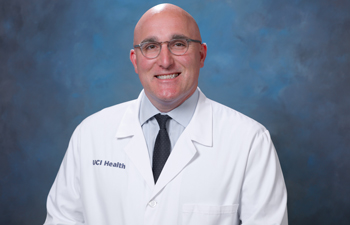UCI Health transplant program helps more patients than ever
Kidney transplant program is the only academic health system-based one in county

Orange, Calif. — The UCI Health Kidney Transplant Program is adding years and improving the quality of life for hundreds of people living with chronic and end-stage kidney disease, serving 40% more patients in 2024 than the previous year.
The kidney transplant team at UCI Health, the only academic health system in Orange County, has long filled a critical need in the region. It is the county’s oldest and largest kidney transplant program. It is also the only one based at an academic health system, along with the pancreas transplant and combined kidney-pancreas transplant programs.
A leading transplant center
The UCI Health program has been on a growth trajectory for years, transplanting 221 kidneys in 2024, up 40% from 134 in 2023. This growth accounts for 20% of the increase in kidney transplant volume nationally, according to Dr. Robert R. Redfield III.
But as Redfield, a professor and chief of transplant surgery at the UC Irvine School of Medicine, points out, “It’s not about hitting a number.”
When the program transplanted its 200th kidney of the year in August 2024, he considered the deeper meaning of that milestone.
“It’s really a reflection of the dedication and the hard work and commitment of everyone here. It’s a huge operation and has a huge impact on people’s lives, giving them a second chance at life. It’s an important thing to celebrate.”
California is home to nearly 20,000 of the more than 103,000 people who are waiting for a kidney transplant in the United States. Nearly 700 patients are on the waiting list at UCI Health, alone.
Living donor kidney transplant
Most transplanted kidneys come from deceased donors, but the wait for a match is a long one: between six and 10 years. A transplant from a living donor can take place within three to six months once all tests are completed, says Redfield.
Because the number of patients needing a kidney transplant far exceeds the availability of matching deceased donor kidneys, UCI Health launched a program to encourage living kidney donors more than a decade ago.
A kidney from a living donor also offers significant advantages, including a lower risk of rejection and better and longer function than kidneys from deceased donors. A kidney from a deceased donor may last 8 to 12 years, while a living donor’s kidney lasts between 15 and 20 years.
Living donors can be friends or family who are a match with the recipient. They may also be donors with no connection, known as non-directed donors. The number of living donors at UCI Health has been on a growth trajectory for several years, but there’s always room for improvement.
“We want to see more living donors,” says Dr. Uttam G. Reddy, medical director of kidney transplantation at UCI Health.
“I view dialysis as a bridge to transplant, and we want to keep that bridge as short as possible.”
Outcomes surpassing the national average
Reddy is also proud of the outcomes the team has achieved for patients, which exceed national averages.
“Our outcomes are on par with some of the top transplant programs in the country. That’s the gold standard for me.”
In addition, the state-of-the-art outpatient dialysis program at UCI Health helps prolong the lives of people with kidney failure, including those who are waiting for a kidney donor or who aren’t candidates for transplantation.
The nephrology team also supports home peritoneal dialysis and hemodialysis, and it staffs an inpatient unit for acute dialysis at UCI Medical Center in Orange.
Kidney-pancreas transplants
UCI Health Pancreas Transplant Program is one of the busiest in the nation, ranking in the top 40 in volume.
Recipients of a pancreas transplant may include people with type 1 or 2 diabetes, as well as those with kidney disease or a kidney transplant who would benefit from a pancreas transplant to improve blood-sugar control.
A simultaneous kidney-pancreas transplant frees patients from daily insulin injections and low-blood sugar episodes while dramatically improving quality of life and life expectancy.
Protecting the kidneys
When people develop chronic kidney disease (CKD), their kidneys become damaged and over time may not clean the blood as well as healthy kidneys.
If kidneys do not work well, toxic waste and extra fluid can accumulate in the body and may lead to high blood pressure, heart disease, stroke and early death. However, people with CKD and people at risk for CKD can take steps to protect their kidneys with the help of their health care providers.
But someone with CKD may not feel any symptoms until the disease’s advanced stages. That’s why physicians use blood or urine tests to diagnose and regularly screen for CKD, especially in people who have diabetes, high blood pressure or other CKD risk factors.
If you or someone you know is interested in becoming a living kidney donor at UCI Health, please go to www.livingdonoruci.org
Make an appointment at the UCI Health Kidney Transplant Program by calling 714-456-8441.
Find on-demand care at UCI Health using our On Demand Care Finder




